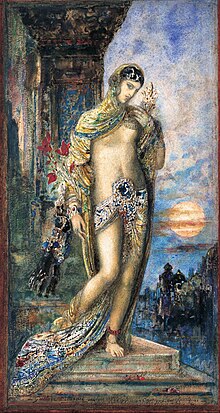
Back Hooglied van Salomo Afrikaans سفر نشيد الأنشاد Arabic ܣܦܪܐ ܕܬܫܒܚܬ ܬܫܒܚܬܐ ARC سفر نشيد الانشاد ARZ Hohes Liad BAR Buku Angka Ende BBC Найвышэйшая песня Саламонава Byelorussian Найвышэйшая песьня Саламонава BE-X-OLD Песен на песните Bulgarian Kanenn ar C'hanennoù Breton
 | |||||
| Tanakh (Judaism) | |||||
|---|---|---|---|---|---|
|
|
|||||
| Old Testament (Christianity) | |||||
|
|
|||||
| Bible portal | |||||

The Song of Songs (Biblical Hebrew: שִׁיר הַשִּׁירִים, romanized: Šīr hašŠīrīm), also called the Canticle of Canticles or the Song of Solomon, is a biblical poem, one of the five megillot ("scrolls") in the Ketuvim ('writings'), the last section of the Tanakh. It is unique within the Hebrew Bible: it shows no interest in Law or Covenant or the God of Israel, nor does it teach or explore wisdom, like Proverbs or Ecclesiastes—although it does have some affinities to wisdom literature, as the ascription to the 10th-century BCE King of Israel Solomon indicates. Instead, it celebrates sexual love, giving "the voices of two lovers, praising each other, yearning for each other, proffering invitations to enjoy".[1][2]
The two lovers are in harmony, each desiring the other and rejoicing in sexual intimacy. Modern scholarship tends to hold that the lovers in the Song are unmarried,[3][4] which accords with its near ancient Near East context.[5] The women of Jerusalem form a chorus to the lovers, functioning as an audience whose participation in the lovers' erotic encounters facilitates the participation of the reader.[6]
Marvin H. Pope, in his commentary, quotes scholars who believe the Song would have been ritually performed as part of ancient fertility cults and that it is "suggestive of orgiastic revelry".[7] Though scholars have differed in assessing when it was written, with estimates ranging from the 10th to 2nd century BCE, linguistic analysis suggest an origin in the 3rd century.
In modern Judaism, the Song is read on the Sabbath during the Passover, which marks the beginning of the grain-harvest as well as commemorating the Exodus from Biblical Egypt.[8] Jewish tradition reads it as an allegory of the relationship between God and Israel. In Christianity, it is read as an allegory of Christ and his bride, the Church.[8][9]
- ^ Garrett 1993, p. 366.
- ^ Alter 2011, p. 232.
- ^ Andruska 2022, p. 202.
- ^ Alter, Robert (2015). Strong As Death Is Love: The Song of Songs, Ruth, Esther, Jonah, and Daniel, A Translation with Commentary. W. W. Norton & Company. p. PT23. ISBN 978-0-393-24305-5.
- ^ Andruska, J. L. (2021). "Unmarried Lovers in the Song of Songs". The Journal of Theological Studies. 72 (1): 1–18. doi:10.1093/jts/flab019. ISSN 0022-5185.
- ^ Exum 2012, p. 248.
- ^ Pope, Marvin H. (1995). Song of Songs. Yale University Press. pp. 24–25, 222. ISBN 978-0-300-13949-5.
- ^ a b Sweeney 2011, p. unpaginated.
- ^ Norris 2003, p. 1.